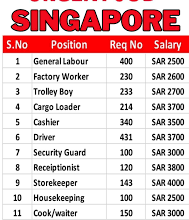How Africans can Apply for Farm Jobs in Spain in 2025: A Complete Guide

Spain’s thriving agricultural sector continues to create thousands of job opportunities each year, and in 2025, African workers are once again eligible to apply for various farm jobs across the country. Through seasonal work visas, bilateral migration agreements, and direct recruitment programs, Spain is actively welcoming foreign labor to support its vital farming industry. This article provides a detailed guide for Africans interested in working legally in Spain’s agricultural sector—including available jobs, visa processes, income expectations, and practical tips for a successful application.
Types of Farm Jobs Available
Spain’s agricultural output is both seasonal and regional, offering a wide variety of farm roles depending on the time of year and location:
-
Fruit Picking
-
Strawberries (Huelva): February to June
-
Grapes (La Rioja, Catalonia): August to October
-
Oranges (Andalusia): November to March
-
-
Olive Harvesting
-
Concentrated in Andalusia, especially Jaén and Córdoba, typically from October to January.
-
-
Vegetable Farming
-
Tomatoes, cucumbers, lettuce, and peppers are grown mainly in Murcia and Almería, with jobs available year-round.
-
-
Greenhouse Work
-
Involves planting, maintenance, and harvesting within controlled environments, especially in Almería.
-
-
Livestock Support
-
Includes feeding, cleaning, and assisting with dairy or meat production in rural areas across Spain.
-
-
Plant Nurseries
-
Roles include planting, pruning, and transplanting in nursery environments or tree farms.
-
Expected Earnings and Benefits
Earnings vary by region, employer, and job type, but most farm workers can expect:
-
Hourly Wage: €8–€12/hour
-
Monthly Income: €1,000–€1,800/month (depending on hours and contracts)
-
Additional Benefits: Some jobs provide free or subsidized accommodation and meals, especially in seasonal programs.
Keep in mind that some roles are paid per kilo or crate, meaning faster and more efficient workers can earn more.
Visa Options for African Workers
To work legally on a Spanish farm, African applicants need to secure one of the following permits:
1. Seasonal Work Visa (Trabajo de Temporada)
-
Requirements:
-
Valid job offer from a registered Spanish employer
-
Proof of return to country of origin after contract
-
Health insurance and accommodation documentation
-
-
Application Process:
-
Employer applies for authorization in Spain
-
Once approved, the applicant applies for a visa at the Spanish embassy or consulate in their home country
-
2. Circular Migration Programs
Spain has bilateral agreements with several African countries, including Morocco, Senegal, and The Gambia. These programs allow workers to:
-
Work for a fixed seasonal period (usually up to 9 months)
-
Return home after the season
-
Reapply the following year with priority access
In 2025, a pilot project involving 50 Gambian workers is being launched to allow participation in fruit harvesting seasons in regions like Huelva and Murcia.
How to Find and Apply for Jobs
There are several ways African applicants can find verified farm jobs in Spain:
Official Platforms
-
SEPE (Spanish Public Employment Service): sepe.es
-
EURES (European Job Mobility Portal): eures.ec.europa.eu
Job Portals
Recruitment Agencies
-
Adecco, Randstad, Manpower, and Fruitful Jobs often list farm opportunities and can help navigate visa sponsorship.
Direct Contact with Employers
Farm cooperatives such as Anecoop and regional growers in Andalusia, Murcia, and Catalonia sometimes hire directly. Contact them via email with a CV, availability dates, and work experience.
Tips for a Successful Application
-
Apply Early
-
Seasonal jobs are filled 2–3 months before the harvest. Apply between October and January for spring jobs, and between May and July for autumn roles.
-
-
Gather Documents
-
Passport, employment contract, medical certificate, police clearance, and accommodation proof are typically required.
-
-
Learn Basic Spanish
-
While not always mandatory, knowing some Spanish greatly increases your chances of being hired and succeeding in your role.
-
-
Understand Your Rights
-
Farm workers in Spain are entitled to fair wages, legal contracts, and decent working conditions. Learn about your rights to avoid exploitation.
-
-
Use Verified Channels
-
Always apply through government portals, consulates, or registered recruitment agencies to avoid scams.
-
African Countries with Migration Agreements
Spain currently has active or expanding migration agreements with:
-
Morocco: 15,000+ workers annually
-
Senegal: Seasonal migration programs active
-
The Gambia: Pilot project started in 2025
-
Guinea and Mali: Under negotiation for future participation
These agreements include organized recruitment, transportation, housing arrangements, and return guarantees to ensure legal and safe labor mobility.
Final Steps to Start Your Journey
-
Check the harvest schedule in Spain for your desired job.
-
Register with employment platforms and apply for open positions.
-
Secure your employment contract and request your visa through the Spanish consulate.
-
Learn about your destination—language, weather, local customs.
-
Connect with diaspora groups and seasonal worker support networks for guidance.
Farm work in Spain offers a promising path for African workers seeking legal employment, steady income, and seasonal mobility. With the right preparation, use of official channels, and awareness of your rights, 2025 could be the year to plant new seeds of opportunity—one harvest at a time.
Source: Thepressradio.com


